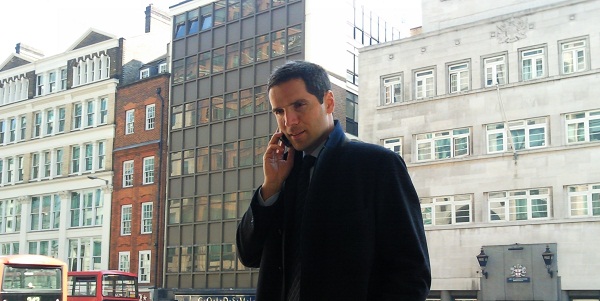
+Mr Tordable gets a call outside Liverpool St. Station / V.J.
LONDON | City and local investors in PAVE, a new Spanish secondary trading platform, must be happy to have recently got Equiduct and EuroCCP on board.
Equiduct will be the electronic service provider for PAVE’s stock operations. It will connect private equity firms in Spain to the Square Mile’s capital funds and brokerage houses, which according to PAVE will allow it to reduce position fees 66 per cent and stir competition in one of the, so far, most conservative capital markets of the European Union. On the other hand, the pan-European clearing house EuroCCP will provide central cash equity clearing.
These deals are likely to set a faster pace for the Barcelona-based market to open transaction activity and challenge the official Bolsas y Mercados Españoles or BME, whose grip on the financial sector reaches 97.4 per cent (Reuter Thomson estimates). Speaking for TC, PAVE’s founder and Chief Executive Javier Tordable said “it’s been four years since the European Financial Affairs Commission approved the regulation necessary to end monopolies in the capital markets, and it has already happened everywhere but in Spain. The time has come for the regulator to open up the sector.”
Last January, the Spanish regulator Comisión Nacional de Mercados y Valores gave the company Interclear shared privileges to register other platform’s trading orders. Interclear, although being part of BME, is meant to act as an independent institution. Yet, it is currently applying stricter deadlines for BME’s competitors like Chi-X and Turquoise with even higher cost rates per trade, too, which will affect PAVE.
Mr Tordable brushes off these barriers: “If we don’t do it, someone else will. At the moment, foreign multilateral trading facilities have eaten less than three per cent of the cake not only because there seems to be an institutional opposition. The truth is that they aren’t focused in Spain’s market. We are.”
Carol Clark, analyst at Financial Markets Group, believes “alternative markets increasingly rely on high-frequency trading, and there is doubts cast over its consequences. Electronic mistakes can bring down stock markets in a matter of minutes.” PAVE’s founder explains that “high-frequency and logarithm strategies are already between 20 per cent and 25 per cent” of the daily trading in BME.
Mr Tordable assures PAVE counts on Spanish major banks and hedge funds to raise sufficient initial capital. He did not disclose names as some may be BME’s shareholders. The new facility intends to be ready to fully launch this September, so Spain’s financial market will soon feel the update.





Be the first to comment on "Is Mr Tordable the Spanish financial markets’ death threat, or their saviour?"